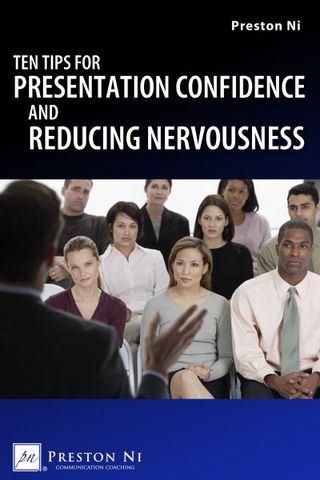Stage Fright
5 Tips for Reducing Public Speaking Nervousness
How to reduce the fear of public speaking.
Posted May 14, 2013 Reviewed by Kaja Perina

“There are two types of speakers. Those who get nervous and those who are liars.”
― Mark Twain
Did you know that according to the Wall Street Journal, public speaking is the number one fear in America? The fear of death is ranked number two! That’s right—we seem more afraid of public speaking than we are of physical demise, heights, jumping out of a plane, or dreaded in-laws.
If you think about it, fear of public speaking is also a fear of death—an emotional death. We feel naked and exposed in front of an audience. We think people are going to scrutinize everything we say and do. We pressure ourselves to be perfect, or else our self-worth suffers. We dread confronting the possibility of rejection.
Now for the good news, most of us can reduce our anxiety of public speaking and increase our confidence by avoiding a few poor habits, while incorporating some helpful ideas. The following are five tips to reducing public speaking nervousness, excerpted from my reference guide (click on title): "Ten Tips for Presentation Confidence and Reducing Nervousness".
1. Don’t Expect Perfection from Yourself
None of us are perfect. We all know that. Yet when it comes to public speaking, some of us tend to kick ourselves over every little perceived mistake we make. We magnify our imperfections, while ignoring all that’s good and well. The truth is, even the best, most experienced speakers make many mistakes. When they do, they recover, keep going gracefully, and all is well. This is one of the keys to public speaking success: to keep going gracefully. The audience will never know most of your mistakes, unless you halt your speech, break down, and confess them. Carry on with poise. Give yourself permission not to be perfect.
2. Avoid Equating Public Speaking to Your Self-Worth
If you’re reading this article, you’re probably a successful professional who has worked hard to get to where you are today. Public speaking is only a small part of your overall professional ability. If you’re not confident at it, there are many ways to help you improve. I’ve seen otherwise intelligent and capable professionals shrivel up on stage, as if suddenly nothing about them is right. Whether you’re good at public speaking or not has nothing to do with your value as a person. It’s simply a skill that you can learn and become better at with practice.
3. Avoid Being Nervous About Your Nervousness
Singer-songwriter Bruce Springsteen, legendary for his live concert performances, once observed that if he felt completely relaxed before a show, he wouldn’t perform as well as if he had felt nervous. Springsteen knows how to channel his nervousness into excitement and power on stage.
Speakers who lack confidence often feel nervous, and then on top of that feel anxious about the fact that they’re nervous, which compounds the anxiety. That’s a lot of stress to bear.
Nervousness is our adrenaline flowing, that’s all. It’s a form of energy. Successful speakers know how to make this energy work for them, and turn nervousness into enthusiasm, engagement, and charisma. They have fun with it (see confidence tips #8 and #10 below). It’s okay to be nervous. Make the energy work for you.
4. Avoid Trying to Memorize Every Word
Unless you’re reciting the Pledge of Allegiance or your marriage vows, there’s no need to memorize every word of any speech. Attempting to do so will simply increase stress, and cause greater nervousness if the sequence of the words you’re trying to memorize goes amiss.
5. Avoid Reading Word for Word
Avoid reading your presentation word for word from a script. There’s a big difference between reading and speaking. Dry reading dissipates information, often at the risk of the audience tuning out. Speaking is creating an impact with your content and personality, so that not only is your message understood, your professional profile rises. People who read excessively from a script in the U.S. effectively reduce their chances of upward advancement.

For more tips on public speaking confidence, see my reference guide (click on title): "Ten Tips for Presentation Confidence and Reducing Nervousness." You can also contact me for private coaching at commsuccess@nipreston.com.
For more on personal and professional success, see my book: "How to Let Go of Negative Thoughts and Emotions".
Follow me on Twitter!
© 2013 by Preston C. Ni. All rights reserved worldwide. Copyright violation may subject the violator to legal prosecution.




